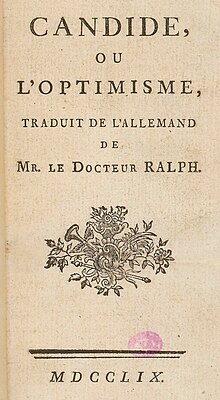 | |
| Author | Voltaire |
|---|---|
| Original title | Candide, ou l'Optimisme |
| Language | French |
| Genre | |
| Publisher | 1759: Cramer, Marc-Michel Rey, Jean Nourse, Lambert, and others |
Publication date | January 1759[3][4] |
| Publication place | France |
Candide, ou l'Optimisme (/kɒnˈdiːd/ kon-DEED,[5] French: [kɑ̃did] ) is a French satire written by Voltaire, a philosopher of the Age of Enlightenment,[6] first published in 1759. The novella has been widely translated, with English versions titled Candide: or, All for the Best (1759); Candide: or, The Optimist (1762); and Candide: Optimism (1947).[7] It begins with a young man, Candide, who is living a sheltered life in an Edenic paradise and being indoctrinated with Leibnizian optimism by his mentor, Professor Pangloss.[8] The work describes the abrupt cessation of this lifestyle, followed by Candide's slow and painful disillusionment as he witnesses and experiences great hardships in the world. Voltaire concludes Candide with, if not rejecting Leibnizian optimism outright, advocating a deeply practical precept, "we must cultivate our garden", in lieu of the Leibnizian mantra of Pangloss, "all is for the best" in the "best of all possible worlds".
Candide is characterized by its tone as well as by its erratic, fantastical, and fast-moving plot. A picaresque novel with a story similar to that of a more serious coming-of-age narrative (bildungsroman), it parodies many adventure and romance clichés, the struggles of which are caricatured in a tone that is bitter and matter-of-fact. Still, the events discussed are often based on historical happenings, such as the Seven Years' War and the 1755 Lisbon earthquake.[9] As philosophers of Voltaire's day contended with the problem of evil, so does Candide in this short theological novel, albeit more directly and humorously. Voltaire ridicules religion, theologians, governments, armies, philosophies, and philosophers. Through Candide, he assaults Leibniz and his optimism.[10][11]
Candide has enjoyed both great success and great scandal. Immediately after its secretive publication, the book was widely banned because it contained religious blasphemy, political sedition, and intellectual hostility hidden under a thin veil of naivety.[10] However, with its sharp wit and insightful portrayal of the human condition, the novel has since inspired many later authors and artists to mimic and adapt it. Today, Candide is considered Voltaire's magnum opus[10] and is often listed as part of the Western canon. It is among the most frequently taught works of French literature.[12] The British poet and literary critic Martin Seymour-Smith listed Candide as one of the 100 most influential books ever written.
- ^ Wootton (2000), p. 1
- ^ Cite error: The named reference
aldridge251254was invoked but never defined (see the help page). - ^ Cite error: The named reference
davidson5253was invoked but never defined (see the help page). - ^ Cite error: The named reference
williams123was invoked but never defined (see the help page). - ^ "Candide". Longman Dictionary of Contemporary English. Longman. Retrieved 17 August 2019.
- ^ Candide, ou L'optimisme , traduit de l'allemand de M. le docteur Ralph (1 ed.). 1759. Retrieved 27 May 2015. via Gallica
- ^ Critical Survey of Short Fiction (2001)
- ^ "Pangloss".
- ^ Mason (1992), p. 10
- ^ a b c Cite error: The named reference
davidson54was invoked but never defined (see the help page). - ^ Aldridge (1975), p. 260
- ^ Waldinger (1987), p. ix